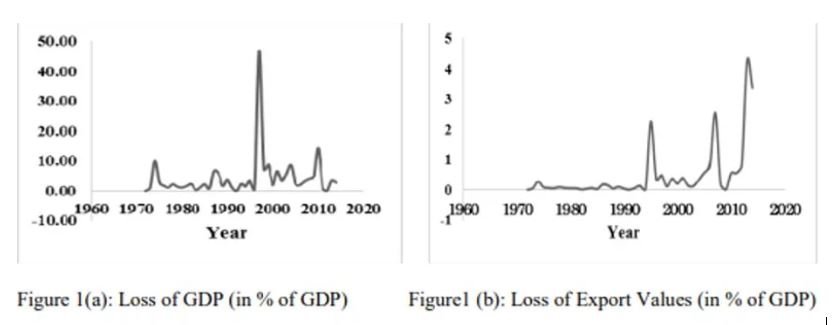Highlight
- BNP imposed the first phase of hartal blockade on October 31
- At least 11 people have been killed since October 28
- More than 130 transports have burnt amid the ongoing Hartal blockade
- Bangladesh counted losses worth USD 1.3 billion each day in the series of hartals in 2013
- Businessmen don’t want hartals and blockades
The ongoing destructive hartal and blockade programs—enforced by the BNP-Jamaat axis—losing effectiveness as people is defying the ways to protest for its wide destruction and arson-terrorism.
BNP and its allies imposed the first phase of a three-day blockade from 31 October to 2 November (continues till now with some short breaks) following their failed October 28 mass rally in the capital.
You can also read: BNP-Jamaat’s Hartal Threatens to Derail Bangladesh’s Progress
Hundreds of thousands of city commuters are suffering and brought out of their homes risking their own lives as BNP saboteurs carry out a series of arson attacks on vehicles even loaded with passengers.
The post-October 28 violence already claimed at least 11 peoples’ lives including a police constable and journalist. BNP’s indiscriminate arson-terrorism also burnt more than 130 vehicles across the country.
Though the hartal-blockade is not a new phenomenon in our political scene but the massive economic, social, and human costs of these movements raise a question of its validity now, especially when Bangladesh is thriving fast towards a developed country and the hartal like movement to make a grinding halt in the journey.
As the people reel in the horror of BNP’s goons like sabotage attack, BNP and its allies will lose the remaining proportion of the support base in the country as citizens are in despair and don’t want a tragic return of 2013-14 period.
People already come out of their homes for their daily necessities and the city traffic looks normal proving BNP’s movements again fall in the circle of shameful failure.
Hartal Bleeds Economy
Hartal forced a grinding stop in the economic wheels as the productive activities like transportation and production in industries, and businesses were disrupted in fear of violence and closure.
Due to disruption in transportation, commodities and industrial raw materials cannot be moved to destinations, the workforce cannot move from place to place, and the wheels of industries cannot rotate in full gear.
Hartals disproportionately impact small businesses, and daily laborers, who can’t run on their savings and have to work on daily basis. The economic repercussions can be substantial, leading to losses amounting to billions of taka in a single day.
Bangladesh experienced a series of hartals and blockades in 2013, 2014, and 2015, causing a paralysis in the economy and resulting in the loss of hundreds of innocent lives.
Bangladesh counted losses worth USD 1.3 billion each day in a series of hartals in 2013, according to an assessment by the Federation of Bangladesh Chambers of Commerce and Industries (FBCCI).

The ready-made garments (RMG) sector, a key export industry, bore the brunt with daily losses reaching Tk 600 crore. Other sectors, including non-export businesses, labor, shopping malls, grocery markets, and casual laborers, collectively incurred losses of approximately Tk 500 crore on a single strike day.
Studies reveal significant losses in the Ready-Made Garment (RMG) sector for the political instability, leading international customers to cancel orders due to uncertain delivery schedules. Researchers have identified a substantial negative economic and statistical impact of hartals on firms’ export activities. They also have found that firms’ exports dropped 6.6% on hartal days.
Prime Minister Sheikh Hasina at a speech delivered in national parliament said that 52 days of hartals in 2015 have caused a loss of over Tk1.2 trillion to the country.
She said 1,173 vehicles were torched and vandalized by the blockade supporters, who also set fire to six launches and carried out subversive acts on trains for 25 times in 2015.
Sensing a horrifying return of hartal-blockade, businessmen in Bangladesh on November 8 said that they do not want such program which destroys trade, commerce, and the country’s economy.
Mahbubul Alam, president of the Federation of Bangladesh Chambers of Commerce and Industry (FBCCI), said, “We the businessmen don’t want hartals and blockades. We want to do business.”
Political Stability behind Bangladesh’ Economic Miracle
Bangladesh has enjoyed a sense of political stability since 2009, under Prime Minister Sheikh Hasina whose Awami League is in power for the third time in a row.
Political stability always creates ideal ground for foreign investment and smooth business. From a country of food deficit, Bangladesh has today become a country of food surplus, thanks to the uninterrupted supply line and seamless connectivity.
So to speak, Bangladesh is the world’s fourth largest rice producer, the fifth largest vegetable producer, the eighth largest potato producer and the fifth biggest producer of freshwater fish, thanks to its network of rivers.
It is not only a country of food surplus but also an exporter of agricultural products.
Bangladesh also has an advanced pharmaceutical industry amounting to US $3 billion.
Through the extraordinary social, and economic management and strong political leadership of Prime Minister Sheikh Hasina, Bangladesh is now achieving 7% average GDP (gross domestic product) growth, crossing the international standard line of the Lower Middle-Income threshold in 2015.
The country’s economy has consistently achieved robust growth, driven by a booming textile industry, exports, and a growing manufacturing sector.
All these gains were made possible mainly because of stability coupled with policy consistency.
But the current precarious destabilization attempt by BNP-Jamaat activists raises concern that if the situation worsen ahead of the polls, Bangladesh may walk back to the tragic line of poverty and uncertainty.
To let Bangladesh shine, opposition political parties should stop these destructive movements immediately and return to the paths of democracy by joining the elections process.


